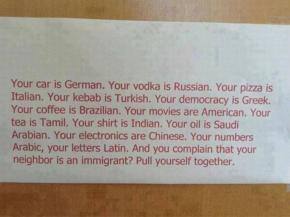Love thy neighbour as your family

Your car is German. Your Vodka is Russian. Your pizza is Italian. Your kebab is Turkish. Your democracy is Greek. Your coffee is Brazilian. Your movies are American. Your tea is Tamil. Your shirt is Indian. Your oil is Saudi Arabian. Your electronics are Chinese. Your numbers Arabic, your letter Latin. And you complain that your neighbour is an immigrant? Pull yourself together.
When this post by Virgin Radio Lebanon popped up on my Facebook news feed, I could not help but laugh awhile. It is funny; no doubt about that. At the same time, it hits the truth on its head. The truth could not have been more blatant.
It reminded me of the fact that this primary school in Auckland Central had run a survey only to discover that its multicultural student population comes from 50-odd countries from across the world. Amazing, isn’t it?
But then, New Zealand is an immigrant-friendly country. It wants skilled migrants to come and make their homes on this land. But all of these migrants do not want to gel with the local population. They want to retain their original cultural identity and that’s what the Ministry of Ethnic Communities seeks to promote.
Why would it be so? We often say that these people have travelled a long distance from their country, but have not really left the country. Other than blaming the migrant community to have a ghetto mentality, have we actually given this much thought?
The question here is, if every product in the supermarket and the mall and all the education gained originate from a foreign land, should we not laud the people from these productive nations for their achievement? Mind you, these are essential items of daily use; stuff that we cannot live without.
Why do they have only partial rights to government benefits when they arrive as immigrants? Even as they go through the gradual process of naturalisation (read: from permanent residents to citizens), they are only referred to as ethnic communities and not part of the mainstream population.
Should we not consider them to be the most important segment of the social community within the country? When these people arrive in a foreign land, they become even more productive than when they were in their country of origin. They usually need to work doubly and trebly hard to prove their expertise – first as an immigrant and then as an ‘ethnic minority’.
Is this the way the system should be? Or is this a form of socio-economic imperialism?
Your car is German. Your Vodka is Russian. Your pizza is Italian. Your kebab is Turkish. Your democracy is Greek. Your coffee is Brazilian. Your movies are American. Your tea is Tamil. Your shirt is Indian. Your oil is Saudi Arabian. Your electronics are Chinese. Your numbers Arabic, your letter...
Your car is German. Your Vodka is Russian. Your pizza is Italian. Your kebab is Turkish. Your democracy is Greek. Your coffee is Brazilian. Your movies are American. Your tea is Tamil. Your shirt is Indian. Your oil is Saudi Arabian. Your electronics are Chinese. Your numbers Arabic, your letter Latin. And you complain that your neighbour is an immigrant? Pull yourself together.
When this post by Virgin Radio Lebanon popped up on my Facebook news feed, I could not help but laugh awhile. It is funny; no doubt about that. At the same time, it hits the truth on its head. The truth could not have been more blatant.
It reminded me of the fact that this primary school in Auckland Central had run a survey only to discover that its multicultural student population comes from 50-odd countries from across the world. Amazing, isn’t it?
But then, New Zealand is an immigrant-friendly country. It wants skilled migrants to come and make their homes on this land. But all of these migrants do not want to gel with the local population. They want to retain their original cultural identity and that’s what the Ministry of Ethnic Communities seeks to promote.
Why would it be so? We often say that these people have travelled a long distance from their country, but have not really left the country. Other than blaming the migrant community to have a ghetto mentality, have we actually given this much thought?
The question here is, if every product in the supermarket and the mall and all the education gained originate from a foreign land, should we not laud the people from these productive nations for their achievement? Mind you, these are essential items of daily use; stuff that we cannot live without.
Why do they have only partial rights to government benefits when they arrive as immigrants? Even as they go through the gradual process of naturalisation (read: from permanent residents to citizens), they are only referred to as ethnic communities and not part of the mainstream population.
Should we not consider them to be the most important segment of the social community within the country? When these people arrive in a foreign land, they become even more productive than when they were in their country of origin. They usually need to work doubly and trebly hard to prove their expertise – first as an immigrant and then as an ‘ethnic minority’.
Is this the way the system should be? Or is this a form of socio-economic imperialism?









Leave a Comment